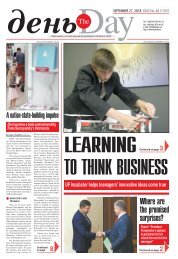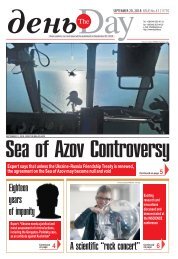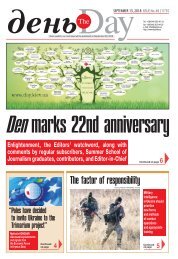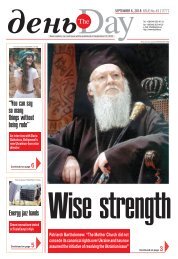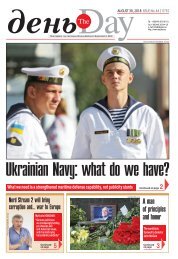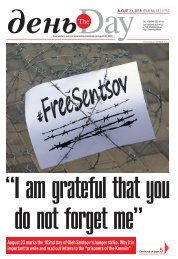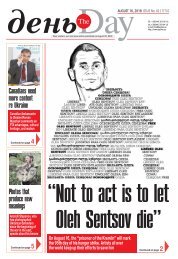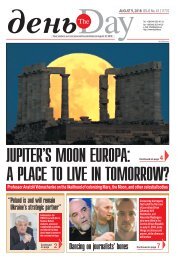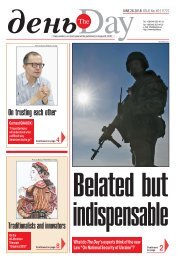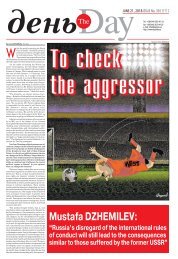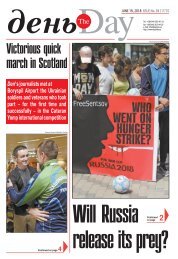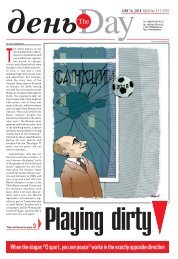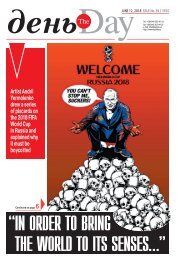You also want an ePaper? Increase the reach of your titles
YUMPU automatically turns print PDFs into web optimized ePapers that Google loves.
WWW.DAY.KIEV.UA<br />
CULT URE No.20 MARCH 29, 2018 7<br />
From the past to the future<br />
THE AUTHORS OF RUSSOPHOBIA ARE PLAYWRIGHTS VARVARA FAER AND MAKSYM KUROCHKIN<br />
The international project<br />
Russophobia was shown on Stage 6.<br />
The content was created by<br />
a Finnish-Russian-Ukrainian team<br />
By Svitlana AHREST-KOROTKOVA<br />
Photos courtesy of the theater<br />
Having quickly won not only Kyivan<br />
audiences, but also visitors from other<br />
cities to their side, founders of the new<br />
theater space called Stage 6 surprised<br />
and pleased the public once again. For<br />
two days, the stage was “occupied” by the<br />
international project Russophobia. The content<br />
was created by a Finnish-Russian-Ukrainian<br />
team. The original idea, created by the director<br />
of the Moscow Teatr.Doc Varvara Faer,<br />
underwent serious changes after the Ukrainian<br />
playwright Maksym Kurochkin joined the<br />
project and drew historic parallels between what<br />
was happening 80 years ago to the nation of<br />
Finland, small but aspiring to obtain sovereignty<br />
and independence from its big neighbor, and<br />
today’s events in Ukraine.<br />
Fears and experience, hopes and reflections<br />
of the play’s characters, who are simple, ordinary<br />
people, are directly related to the themes of<br />
the long-past Winter War and the war lately unleashed<br />
by the former “brother” in Ukraine.<br />
The Theater of Documentary Play, known<br />
as Teatr.Doc, was created in 2002 by several<br />
playwrights working in the genre of documentary<br />
theater. This is a special genre that exists<br />
at the intersection of art and topical social<br />
analysis. The theater’s creative teams make<br />
performances based on meetings with real people<br />
and dealing with the most relevant and<br />
timely issues of the surrounding reality. They<br />
use testimonies of real people, the verbatim<br />
technique, “deep improvisation,” theatrical<br />
games and trainings. Participation in prestigious<br />
theatrical festivals, both in its homeland<br />
and around Europe, has not only failed to protect<br />
the theater from rejection by the current<br />
Russian regime, but become a litmus test for it.<br />
Still, the theater is alive and keeps up its good<br />
work, which should be treated as an act of civic<br />
virtue these days, in my opinion.<br />
“ALL OVER RUSSIA, PEOPLE GO DOWN FOR WORDS. WORDS ARE IMPORTANT AGAIN. BUT IT SEEMS TO ME WE DREAMED OF A DIFFERENT FUTURE.”<br />
RUSSOPHOBIA, STAGE 6<br />
According to the special genre nature of the<br />
theater, Russophobia shows an old man, his body<br />
bent down with life’s pains, remembering how<br />
his child self faced a man flying a red-starred<br />
airplane and trying to shoot him dead with a machine<br />
gun. Meanwhile, our contemporary, who<br />
lives in Kyiv, cannot forgive himself for his absence<br />
during the Maidan protest, because he was<br />
furnishing his long-awaited mortgaged apartment<br />
in Moscow. In parallel, he recalls the many<br />
occasions when he and the entire country of ours<br />
left unanswered spitting and slapping into face:<br />
from allegations about “stolen oil” to the Budapest<br />
Memorandum ultimately proving worthless.<br />
After all, there had been bad omens, blood<br />
had been shed for a long time, starting in the<br />
Baltic States that were the first to do away with<br />
the Sovietism, through Chechnya and the territories<br />
stolen from Georgia, and ending with the<br />
“polite green men” in Crimea. According to the<br />
playwright, the most difficult thing for him was<br />
to realize how totally calm people could be amid<br />
historical upheavals. And this became a chance<br />
to speak out on a topic that deeply worries him.<br />
The show premiered in Tampere at the end of<br />
last year. The Finnish version was titled Rajavirhe<br />
(A Border Incident). However, the play’s<br />
structure and text are the same as it is staged in<br />
Finland, Russia, and Ukraine.<br />
The cast was the troupe of one of Finland’s<br />
most famous independent theaters, the Telakka,<br />
which was named the best theater of the year in<br />
2016. Its artists are known far beyond the country.<br />
For example, Tomi Salmela starred in Jim<br />
Jarmusch’s film Night on Earth. In the project<br />
which was seen in Kyiv, the artists, too, delighted<br />
the public with appropriate performance of<br />
their parts and high professionalism, despite the<br />
documentary theater being a quite difficult<br />
genre.<br />
We managed to have a short talk with Varvara<br />
Faer, who is the director of the Teatr.Doc<br />
and the aforementioned performance.<br />
Originally, the project was conceived as a<br />
retelling of the Finns’ memories about the war<br />
between their country and the USSR. It was a<br />
completely different story, one dealing with<br />
the attitude of a giant country to the world<br />
around. That attitude was unfair... With the<br />
participation of the Ukrainian playwright<br />
Maksym Kurochkin, the narrative of that war<br />
came to be seen from some completely different<br />
perspectives, as revisions of history feelings<br />
gradually yielded to dealing with the explosive<br />
point of today’s reality, which is<br />
Ukraine. Memories of the past have smoothly<br />
turned into forecasts for the future. The play<br />
has already been staged in Finland and in<br />
Ukraine, and there will be a premiere in<br />
Moscow in two days [interview was taken on<br />
March 23. – Ed.]. By the way, the latter is a<br />
challenge to the prevailing attitude there.<br />
What are your impressions of the European<br />
and Ukrainian audiences’ perception of the<br />
events happening on stage, and your assumptions<br />
about the reaction of the Russian audience?<br />
“Yes, Finland and Ukraine have already seen<br />
the complete show, and we held a reading rehearsal<br />
in Moscow a year ago. In Finland, opinions<br />
were divided and ranged from enthusiastic<br />
to deeply indignant ones. Portions of the public,<br />
about a half of it, consider this play to be a piece<br />
of propaganda, and they do not like it. I think it<br />
applies not only to Finland, but to Europe in general.<br />
They want to think independently. They believe<br />
that not everything is so clear-cut, and<br />
maybe, Vladimir Putin is right about something.<br />
They say you need to look into the matter, to give<br />
it a thought, as nothing is 100 percent black or<br />
white. The second half pays attention to my objective<br />
with which I did this show – an outburst<br />
of emotions rather than an analytical reflection.<br />
Living emotion, human feelings, attention to<br />
history’s landmarks are important there. They<br />
are present in the context not for decoration, but<br />
as some highly important accents that must not<br />
be missed.<br />
“The Ukrainian audience was more unanimous.<br />
Even the artists noted that the public was<br />
fantastically attentive, and this filled them with<br />
incredible energy. By the way, we have already<br />
been invited to tour all over Ukraine with this<br />
show. I hope to see you again. I can breathe so<br />
easily in your country... Let us see how the performance<br />
in Moscow will go in a day, but the<br />
reading rehearsal was very well received. One<br />
must take into account here that the Teatr.Doc<br />
caters to an opposition-minded audience, it is<br />
they who will come to watch the show.”<br />
But what about your “persistent admirers”<br />
from the FSB?<br />
“Do you think they will come? We will see...”



